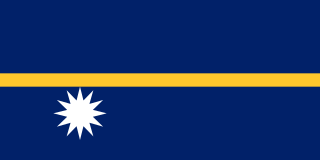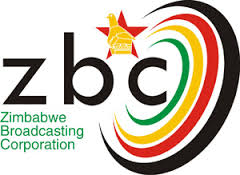The Australian Broadcasting Corporation (ABC) is Australia's national broadcaster, founded in 1929. It is principally funded by the direct grants from the Australian government but is expressly independent of government and partisan politics. The ABC plays a leading role in journalistic independence and is fundamental in the history of broadcasting in Australia.
Telecommunications in Kenya include radio, television, fixed and mobile telephones, and the Internet.

Nauru, officially the Republic of Nauru and formerly known as Pleasant Island, is an island country in Micronesia, a subregion of Oceania, in the Central Pacific. Its nearest neighbour is Banaba Island in Kiribati, 300 km (190 mi) to the east. It further lies northwest of Tuvalu, 1,300 km (810 mi) northeast of the Solomon Islands, east-northeast of Papua New Guinea, southeast of the Federated States of Micronesia and south of the Marshall Islands. With only a 21 km2 (8.1 sq mi) area, Nauru is the third-smallest country in the world behind Vatican City, and Monaco, making it the smallest state in the South Pacific Ocean, the smallest state outside Europe, the smallest island state, and the smallest republic. Additionally, its population of 10,670 is the world's third smallest, after Vatican City and Tuvalu.
The media of Belarus are mass-media outlets based in Belarus. Television, magazines, and newspapers are operated by state-owned and for-profit corporations and depend on advertising, subscriptions, and other sales-related revenue. The Constitution of Belarus guarantees freedom of speech, but this is contradicted in practice by repressive and restrictive laws. Arbitrary detention, arrests, and harassment of journalists are frequent in Belarus. Anti-extremism legislation targets independent journalism, including material considered unfavourable to the president.

The South African Broadcasting Corporation (SABC) is the public broadcaster in South Africa, and provides 19 radio stations (AM/FM) as well as five television broadcasts to the general public. It is one of the largest of South Africa's state-owned enterprises.

The Nauru Regional Processing Centre is an offshore Australian immigration detention facility, located on the South Pacific island nation of Nauru. The use of immigration detention facilities is part of a policy of mandatory detention in Australia.

The Zimbabwe Broadcasting Corporation (ZBC) is the state-controlled broadcaster in Zimbabwe. It was established as the Rhodesian Broadcasting Corporation (RBC), taking its current name in 1980. Like the RBC before it, the ZBC has been accused of being a government mouthpiece with no editorial independence.

The media of Israel refers to print, broadcast and online media available in the State of Israel. The country boasts dozens of newspapers, magazines, and radio stations, which play an important role by the press in political, social and cultural life and cater it to a modern, developed and literate society.
The media of Armenia refers to mass media outlets based in Armenia. Television, magazines, and newspapers are all operated by both state-owned and for-profit corporations which depend on advertising, subscription, and other sales-related revenues. As of 2018, there were few indicators of a healthy and independent media.
The media of Cyprus refers to mass media outlets based on the island of Cyprus, including both the Republic of Cyprus (RoC) and the Turkish Republic of Northern Cyprus (TRNC). Television, magazines, and newspapers are all operated by both state-owned and for-profit corporations which depend on advertising, subscription, and other sales-related revenues.

Baron Divavesi Waqa is a Nauruan politician who was the 14th President of Nauru from 11 June 2013 until 27 August 2019. He previously served as Minister of Adult Education from 2004 to 2007.

Sprent Arumogo Dabwido was a Nauruan politician who served as the President of Nauru between 2011 and 2013, and was also a weightlifter. The son of a parliamentarian, Dabwido was originally elected to the Meneng Constituency in the Parliament of Nauru at the 2004 elections. Having served as Minister for Telecommunications in Marcus Stephen's government from 2009, Dabwido joined the Nauruan opposition faction in November 2011 after Stephen's resignation, and, having passed a motion of no confidence against interim president Freddie Pitcher, was elected president four days later. In his role as president, Dabwido functioned as chairman of the Cabinet of Nauru, and held various portfolios in the Nauruan government.
Topics related to Nauru include:
Nauru Television (NTV), established on 31 May 1991, is the government-owned, non-commercial sole television company in the Republic of Nauru. It is operated by the Nauru Broadcasting Service and overseen by the Nauru Media Bureau.
Kiribati is a developing island nation consisting in 32 atolls and one raised coral island (Banaba) scattered over some 3.5 million square kilometres in the central Pacific. There is access to national media throughout the country.
The Republic of Vanuatu is an officially trilingual state in the western Pacific, the three national languages being English, French and Bislama. There is a diversity of newspapers, but only one, state-owned television channel. Private radio stations are a recent development; there were reportedly none in 2007.
Media in Zambia consist of several different types of communications media: television, radio, cinema, newspapers, magazines, and Internet-based Web sites. The Ministry of Information, Broadcasting Services and Tourism is in charge of the Zambian News Agency which was founded in 1969.

Visitors to Nauru must obtain a visa unless they come from one of the countries eligible for free visa on arrival. All visitors must hold a passport valid for 3 months. Transit visas are not required if the connecting flight leaves within three hours of arrival in Nauru. Business visitors must have a local sponsor.
In January 2014, Nauru's President Baron Waqa fired the country's only magistrate Peter Law, and cancelled the visa of its Chief Justice Geoffrey Eames. Law was fired after issuing an injunction to temporarily halt the deportation of three foreign nationals. Eames issued an injunction in an unsuccessful attempt to temporarily halt Law's deportation. Eames was in Australia at the time and his visa was cancelled, preventing his return to Nauru.
TV, magazines, and newspapers are all operated by both state-owned and for-profit corporations which depend on advertising, subscription, and other sales-related revenues.








